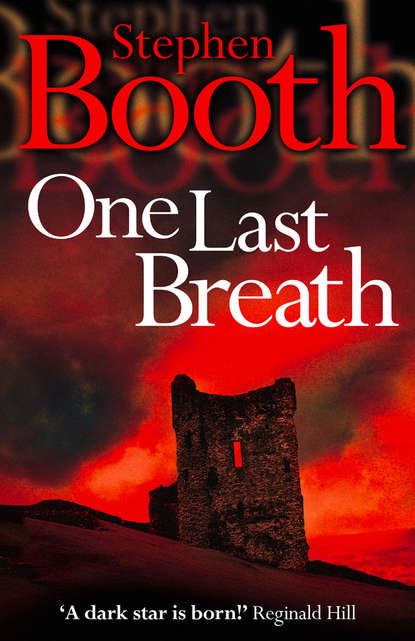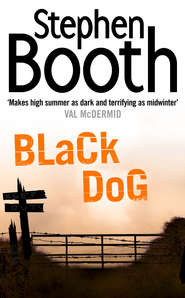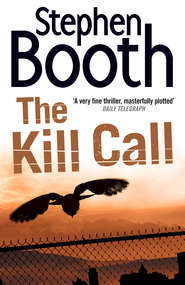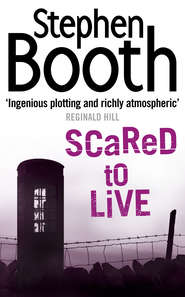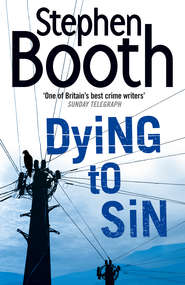По всем вопросам обращайтесь на: info@litportal.ru
(©) 2003-2024.
✖
One Last Breath
Автор
Год написания книги
2019
Настройки чтения
Размер шрифта
Высота строк
Поля
Looking around for the road they needed, Cooper noticed various forms of what he supposed would be called community art. A bus shelter had been converted into the ‘Hathersage Travel Machine’, decorated with wheels and photographs of exotic locations. Across the road, cut-out figures had been lined up against a garden wall. They made him think of targets at the police shooting range. Then he saw that some of the people near the bus shelter were actually queuing at a fish van. A bowl under its tailgate was catching the run-off from thawing ice that had kept the fish fresh on its way from the East Coast docks at Grimsby.
‘Wind up the window, Ben,’ said Fry. ‘There’s a stink of haddock.’
‘Sorry. I’ve got it now.’
Food was a dangerous topic with Gavin Murfin around. Cooper had already noticed the balti restaurant across the road. He fancied a Chicken Dhansah, but he kept the idea to himself.
‘OK, I’ve got it,’ he said. ‘You’ll have to turn round, Gavin.’
Enid Quinn lived in a small estate off Mill Lane. The old mill itself was still largely intact, though elder saplings were growing out of its chimney. Cooper recalled that Hathersage had once been a centre for the needle-and-pin industry, with local people working at grindstones that filled their lungs with steel dust. The industry was remembered now only because conditions in the mills had led to legislation against children being employed as grinders.
The original Mill Cottage stood among stone troughs full of geraniums, with climbing roses hanging from its walls, and pink and yellow petals drifting on to a stone-flagged path. Ash trees swayed and creaked in the breeze as a string of cement tankers rumbled over a nineteenth-century railway bridge.
And then there was the Moorland estate. The houses weren’t particularly new – not built in the last couple of decades, anyway. So the estate had been there most of Cooper’s lifetime, without him suspecting its existence. He’d only ever seen what the tourists saw of Hathersage – the historic buildings, the spire of the church, the gritstone edges in the distance.
‘It looks as though we’re in right-to-buy country,’ said Murfin.
‘How can you tell?’
‘Those first two places had dormer windows. You wouldn’t do that in a council house.’
A man in blue overalls was smoking a cigarette in the cab of a pick-up truck with the name of a property management company painted on its cab door. Murfin was right – this must be only partly a council estate these days, if at all. Many of the tenants would have bought their cement-rendered semis when the right-to-buy policy came in during the 1980s.
They parked near a patch of grass on Moorland Avenue, and Murfin stayed by the car as Fry and Cooper walked up the path to number 14. While Cooper rang the bell, Fry looked with amazement at an ornamental pig squatting by the doorstep. She gave it a tentative kick to see what it was made of. It didn’t budge.
‘Cement,’ said Cooper.
Getting no answer to the bell, he knocked. His knock created a hollow sound that echoed through the house.
‘It doesn’t look as though she’s in,’ called Murfin, who had been watching the windows.
‘Thanks a lot, Gavin,’ said Fry. ‘We’ll take a look round while we’re here. Ben, why don’t you check out that alley by the side of the house?’
Cooper looked where she was pointing. ‘A gennel, we call it.’
The gennel ran alongside the garden of number 14 and past a row of houses set at right angles to it. Money had been spent on some of these properties: porches had been added, and driveways opened up. Satellite dishes sat under the eaves. Over here was an imitation wishing well, and there a few square yards of paving for a caravan to stand on.
Cooper could see into Mrs Quinn’s garden from here. The flowerbeds contained more ornamental concrete figures: squirrels, rabbits, a badger, an otter and a giant frog. At the end of the path he came out almost opposite the railway station. He could see Hathersage Booths and Throstle Nest on the long incline towards Surprise View in the east.
He turned to walk back and saw Fry beckoning to him. A patrol car had pulled up and two uniformed officers had stationed themselves outside number 14. They’d be attracting plenty of attention soon.
‘Gavin found a neighbour,’ said Fry. ‘She says Mrs Quinn tends her husband’s grave on Tuesday mornings. You two can go up the church to find her. I’m going to talk to the neighbours. I’m presuming you know the way, Ben.’
* * *
With Cooper and Murfin out of her hair, Diane Fry left the two PCs at the gate of number 14 and spent some time talking to anyone she could find at home in Moorland Avenue, using her custody suite mugshot of Mansell Quinn to prompt memories.
She found two residents who remembered Quinn because of the 1990 murder case, but both of them assured her confidently that he was in prison and would be there for the rest of his life. It was curious how convinced the law-abiding public were that a life sentence actually meant life. After all these years of double-speak, they still believed that the meaning of a word was the same as what it said in the dictionary. But Fry knew better. In the police service, they’d been living in Orwell’s 1984 since … well, the 1990s, at least.
Suddenly, she felt a strong urge to know what Angie was doing. She’d left her sister in the flat this morning, talking about going for a walk or catching a bus into town to have a look round. But she’d only been talking about it. Angie had been half-dressed, curled up in an armchair with her knees in the air, painting her toenails. She’d looked drowsy, even content. Of course, that was only because she hadn’t been awake very long.
Angie had insisted from the beginning that she’d been through rehab in Sheffield and was clean now. But suspicion was a difficult habit to break. Fry felt guilty every time she caught herself assessing her sister’s behaviour for signs of euphoria or drowsiness, slurred speech or inattention, or when she found she couldn’t look Angie in the eyes without checking for constricted pupils.
Though she despised the weakness of addiction, Fry was terrified at the thought of seeing her sister suffer the agonies of withdrawal if she missed a fix. The fact that Angie was her own flesh and blood made a difference that defied logic. In a way, Fry would prefer to see the signs of continued use rather than witness her sister in the condition she’d known addicts reduced to. She had seen plenty of them back in Birmingham, and even in the custody suite at West Street. Within a few hours of their arrest, they would decline from restlessness to depression, and the vomiting, diarrhoea and muscle cramps would set in, or the shivering and the sweating. And then they’d begin screaming for the methadone. The relief of the pain without the high.
Fry tried to dial her home number, but eventually her own voice cut in on the answering machine. That didn’t mean Angie wasn’t there, just that she wasn’t bothering to answer the phone. She ought to have a mobile of her own. For a moment, Fry thought of buying her one – she had a feeling she could add an extra handset to her account quite easily. But that would be like treating her sister as a child.
Like a neurotic mother, Fry found herself imagining the worst: Angie still sitting in the armchair at Grosvenor Avenue, heating white powder on a piece of tin foil and inhaling the fumes through a tube. Chasing the dragon – was that still what they called it? Heroin dealers existed in Edendale, of course, as they did in every market town in England, cutting their product for sale on the street with glucose, flour, chalk or even talcum powder. But in E Division they weren’t quite such big business or so well organized as the city operations, where Asian gangs had been moving in recently to compete with the East Europeans.
Clean, Angie might be. But most worrying of all for Fry was the question of where her sister might have been getting a hundred pounds a day or more to feed her habit. And who she’d been scoring the smack from.
Ben Cooper stood over the grave and read the inscription: Here lies buried … it began. But that’s what they all said. In this case, was it true?
‘It’s ten feet long, if it’s an inch,’ said Gavin Murfin. ‘I don’t believe it.’
Old churchyards always filled Cooper with a sense of history. It was the thought of generation upon generation of the same families mouldering together under his feet. According to the memorial stones around him, scores of Eyres and Thorpes, Proctors and Fieldings had been buried here over the centuries. But this churchyard seemed to have mixed history with folklore.
‘A thirty-inch thigh bone is impossible anyway,’ said Murfin. ‘It must have been an elk or something.’
‘An elk?’
‘A reindeer. A moose. God, I don’t know. Something big, anyway. Something that lived around here in the Ice Age.’
The Church of St Michael and All Angels stood high above Hathersage next to an earthwork built by Danish invaders. Transco had dug a hole in the road outside the church gates, and the smell of gas was strong when they got out of the car. But at least mobile phones worked up here. In many areas of the Hope Valley it was impossible to get a signal.
Murfin had produced a ham sandwich from his pocket. He brushed some crumbs on to the grave, as if he were a grieving relative scattering the first handfuls of soil at a funeral, paying tribute to the dead. The plaque on the grave was quite specific: Here lies buried Little John, the friend and lieutenantof Robin Hood.
‘Is there any evidence?’ said Murfin. ‘I mean, have they done the DNA?’
Among the newer graves to the west of the church, they could see a figure in a red T-shirt, with short blonde hair. She was wearing yellow rubber gloves, and she was dusting a headstone with what looked like a hearth brush. She bent occasionally to pull at a few weeds.
‘You definitely think that’s her?’ said Murfin.
‘There’s no one else here. And she answers the description the neighbour gave.’
‘OK, let’s talk to her then.’
‘No, we ought to wait until she’s finished,’ said Cooper.
‘Why?’
‘She’s tending her husband’s grave, Gavin.’
‘Right. And you don’t want to interrupt her while she’s enjoying herself. I suppose she’ll start singing in a minute, and do a little dance.’
‘Gavin …’
‘Yeah?’





